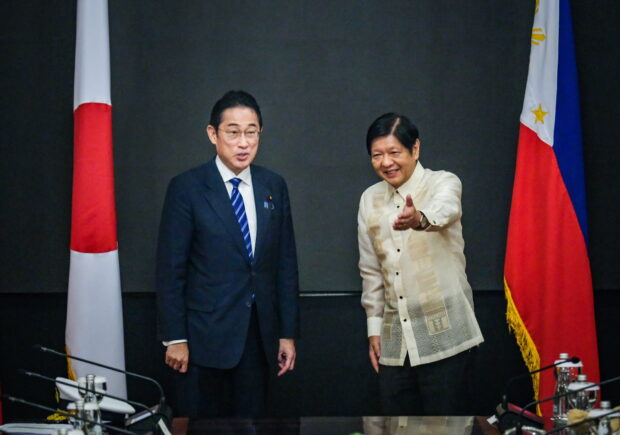PH, Japan start talks on visiting forces deal

MUTUAL INTERESTS | Japanese Prime Minister Fumio Kishida and President Marcos at the start of a bilateral meeting in Malacañang on Nov. 3 wherein they agreed to start official talks on a reciprocal access agreement between the armed forces of the Philippines and Japan. (PPA POOL)
MANILA, Philippines — The Philippines will begin this week the formal round of negotiations with Japan on a reciprocal access agreement (RAA) that will serve as the legal basis for both countries when their troops enter each other’s territory for joint military exercises, Defense Secretary Gilberto Teodoro Jr. said on Monday.
The negotiating team led by Defense Undersecretary Pablo Lorenzo left for Tokyo on Monday morning to jump-start the discussions, Teodoro said on the sidelines of a pre-anniversary forum of the Armed Forces of the Philippines.
President Marcos and Japanese Prime Minister Fumio Kishida earlier this month agreed to start official talks on the agreement as part of efforts to strengthen their alliance in the face of China’s aggressiveness in the region.
In a joint statement following Kishida’s working visit to Manila, Mr. Marcos said: “We are cognizant of the benefits of having this arrangement both to our defense and military personnel and to maintaining peace and security in our region.”
Once the Philippines and Japan agree on the draft of the RAA, it will be submitted to the Philippine Senate and Japan’s legislature, the National Diet, for ratification.
Article continues after this advertisementThis will make the Philippines the first country in the Association of Southeast Asian Nations (Asean) to have such an RAA with Japan.
Article continues after this advertisementThe proposed RAA is similar to the Visiting Forces Agreement (VFA) between the Philippines and the United States and the Status of Visiting Forces Agreement (Sovfa) between the Philippines and Australia.
Japan, for its part, had earlier forged an RAA with the United Kingdom and Australia.
Senate support
Teodoro did not say how long the discussions would take place, but he expressed hope that a deal would be reached soon.
“I encourage them to thresh out all the issues as soon as possible and to network with the Senate of the Philippines so that we can have a speedy ratification. Of course, we have to respect the independence of the Senate and their wishes,” he said.
Senate President Juan Miguel Zubiri earlier said they were supportive of a potential treaty with Japan.
Speaking to reporters after Kishida’s address to a joint session of Congress as part of his visit, Zubiri said he would push for the RAA in the Senate, adding that senators were “ready to tackle” the proposed agreement, which also expands the different activities that visiting forces could engage in and establishes a framework on how to resolve any issue arising from their visits.
He said an RAA between Japan and the Philippines would allow both nations to boost their interoperability and cross training of both its navy and coast guard forces—members of Japan’s Self Defense Forces (SDF) in the Philippines and Filipino troops in Japan.
Manila and Tokyo have territorial disputes with Beijing —the Philippines in the West Philippine Sea and Japan in the East China Sea. Both have shared concerns over attempts by China to “unilaterally change the status quo by force,” without directly mentioning China.
Patrol with Australia
The Philippines on Monday also wrapped up an inaugural “maritime cooperative activity” with its Australian counterpart in the West Philippine Sea, days after it held a similar exercise with the United States.
AFP chief Gen. Romeo Brawner Jr. said the joint patrols with Australia were “very successful,” just like an earlier patrol with the United States, despite reports of Chinese shadowing of air and naval assets.
“We were able to achieve the objectives that we set out through this activity,” he told reporters.
On Sunday, two Chinese fighter jets circled above a Philippine Air Force A-29B Super Tucano for about 15 minutes during the joint patrol with Australia.
“Our aircraft was able to finish its mission. They finished the maritime air patrol in the West Philippine Sea without any untoward incident,” Brawner noted.
“We don’t know what [message] they are trying to send us, but for us, it is very clear that what we are doing are legitimate operations because we have all the right to patrol our territorial seas and our exclusive economic zone,” he said. “That is exactly what we are doing, but this time, we are doing it with our allies and our partners.”
Brawner also raised the possibility of holding multilateral patrols in the West Philippine Sea by next year.
“There is no specific plan yet for that but we are continuously talking with our allies and partners, so this is a possibility probably by next year. There are lots of preparations for this. It’s not as easy as just sailing together,” he said.